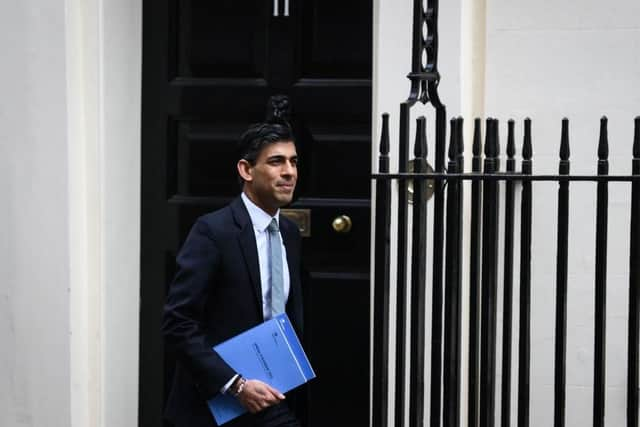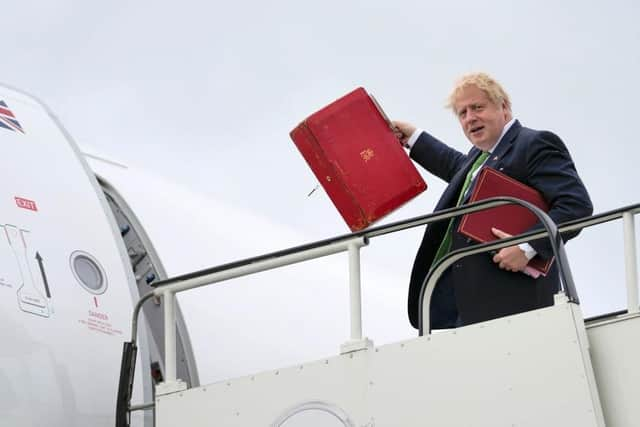Cost of living: Government outlines support it has made available for families facing financial pressures
and live on Freeview channel 276
Household bills, food prices and fuel costs are all on the increase; it’s a challenging time across the globe due to a number of factors including the ongoing Russian invasion of Ukraine.
There have been multiple calls for the Government to announce an emergency budget, following on from Chancellor Rishi Sunak’s Spring Statement in March.
Advertisement
Hide AdAdvertisement
Hide AdAs prices spiral and families are left feeling the pinch, we outline the actions taken by the Government – which they say are worth more than £22billion across 2022-2023 – to help those most in need.
Fuel duty
Announced by the Chancellor as part of the Spring Budget; a 12-month cut in the main rates of fuel duty for petrol and diesel of 5p per litre.
The Government says this cut – which came on top of 12-year freezes to fuel duty – represents savings worth almost £2.4billion for customers over the next year.


Mr Sunak said in March: “The biggest cut to all fuel duty rates – ever.”
National Insurance thresholds
Advertisement
Hide AdAdvertisement
Hide AdFrom this July, National Insurance starting thresholds will go up to £12,750.
The Government says a typical employee can expect to save more than £330 a year, keeping more of what they earn.


The Chancellor said: “The largest increase in a basic rate threshold – ever. And the largest single personal tax cut in a decade.”
National Insurance Credits
Lower-earning self-employed people can keep more of what they earn thanks to a reduction in National Insurance Credits (NICs).
Advertisement
Hide AdAdvertisement
Hide AdFrom last month, they did not have to pay Class 2 NICs on profits between the Small Profits Threshold and Lower Profits Limit.
This change represents a tax cut for around 500,000 self-employed people worth up to £165 per year, the Government said.
Universal Credit
The taper rate for Universal Credit has been reduced to 55%.
The Government says this tax cut is worth around £1.9billion in 2022-2023, enabling around 1.7million households to keep an additional £1,000 annually.
Energy bills
Advertisement
Hide AdAdvertisement
Hide AdDomestic energy customers are due to receive a £200 reduction in energy bills in the Autumn. This will be paid back automatically over the next five years.
Meanwhile, households in Council Tax bands A to D in England will also receive – or will have already received – a £150 Council Tax Rebate.
This £150 sum does not have to be paid back.
Household Support Fund
An additional £500million was released last month to help the most vulnerable households with the cost of essentials.
In England, the country’s share of the money will be distributed to local authorities, who in turn can provide direct help to those who need it.
Advertisement
Hide AdAdvertisement
Hide AdThe Fund supports people in buying essentials including food and clothing, and paying for utilities.
Alcohol duty
Alcohol duty has been frozen for 2022-2023 for the third year in a row.
This translates to consumers will saving 3p off a pint of beer, 2p off a pint of cider, 14p off a 75cl bottle of wine and 52p off a 70cl bottle of Scotch.
Details of the above actions were published on a Government factsheet, which was released on the same day as Mr Sunak’s budget statement.
‘It’s getting beyond a joke’
Advertisement
Hide AdAdvertisement
Hide AdAmid speculation that the Prime Minister was going to make an announcement about the cost-of-living crisis earlier this week, we asked readers across the North East to share their views on how THEY think the Government should intervene to support families with spiralling bills.
This is what you had to say on our Facebook pages:
Sven Burns: “It’s getting beyond a joke, pensioners could barely afford to live last year. Now they are expected to pay almost double on bills, let alone the rest of us struggling.”
Elaine Valerie Smith: “They can't ease it, it's not just our country suffering it’s a worldwide problem.”
Sophie Danielle De Villiers: “Gas and electric companies should be paying more tax, not making record profits.”
Advertisement
Hide AdAdvertisement
Hide AdStephen Sullivan: “We need radical change. Not short fixes.”
Roy McEvoy: “The very least they, or any government, could do is talk to the power companies and retailers about keeping their cost down!”
Wendy Hawkyard Bell: “Make them give up their food and drink allowances and their pay rise to help the poor afford food and other essentials.”
Carl Johnson: “I actually hope they don't and I hope every voter remembers this and all their other ‘faux pas’ when it comes to election time!”

